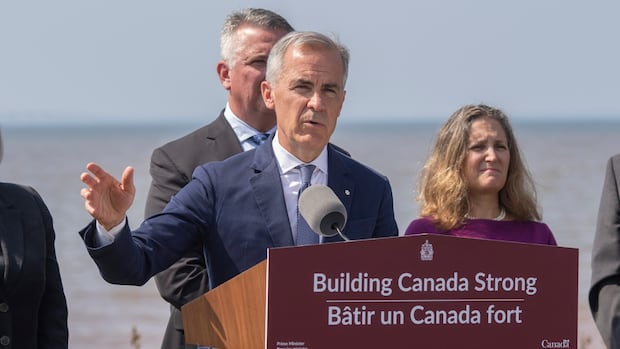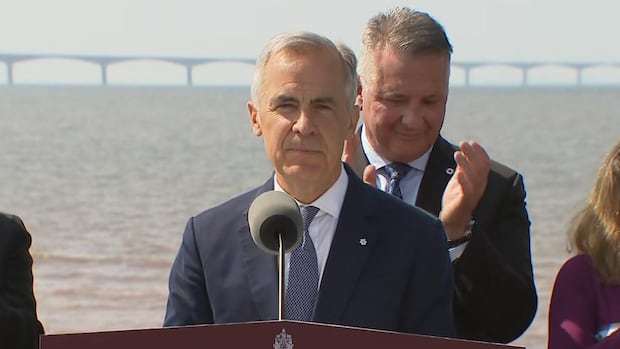The federal government is slashing tolls on the Confederation Bridge and lowering ferry fares in Eastern Canada, Prime Minister Mark Carney announced while in P.E.I. on Monday.
“It’s always a good day when you wake up on Prince Edward Island, and today is an especially good day. It’s a big day,” Carney said at the announcement on Prince Edward Island’s South Shore, with the Confederation Bridge visible behind him.
Effective Aug. 1, the cost of crossing the bridge, which connects P.E.I. with New Brunswick, will fall to $20 from $50.25. Transport trucks will also pay a flat rate of $20. There’s no change in the cost for cyclists, pedestrians, shuttles or motorcycles.
Fares for passengers, cars and commercial traffic on ferry services in Eastern Canada that are federally supported will go down by 50 per cent.
Those ferries provide service between:
- Magdalen Islands, Que., and Souris, P.E.I.
- Wood Islands, P.E.I., and Caribou, N.S.
- Saint John, N.B., and Digby, N.S.
“Today’s announcement will mean more Canadians can see more of Atlantic Canada,” Carney said.
Prime Minister Mark Carney, speaking in Prince Edward Island on Monday, announced a major cut on the toll for the bridge linking the island to New Brunswick, as well as changes to key ferry fares in Eastern Canada, saying the savings will go back into the economy ‘year after year.’
Fares for passengers and vehicles on the ferry that operates between Nova Scotia and Newfoundland and Labrador are also going down. Ottawa has pledged to increase funding to the operator, Marine Atlantic, to lower the price by 50 per cent. Ottawa is also freezing commercial freight rates on that route.
“The costs of the bridge and ferry don’t just fall on tourists,” Carney said. “If we are going to build a stronger, more united economy, and we are doing that, we are going to need to make it more affordable to travel around this country, for people and for businesses.”
Starting Aug. 1, Islanders and visitors will save some money when they leave Prince Edward Island. The toll for the Confederation Bridge is being reduced to $20, while the cost to take ferries is being cut by half. CBC’s Tony Davis spoke with people in Charlottetown about what it means for their travel plans.
For Rob Lantz, premier of P.E.I., Monday’s announcement validated his months-long lobbying effort to reduce the fees.
“I’ve been a real pest, a thorn in the side of everyone in Ottawa,” he said.
“We’ve been pushing for this forever. It’s been 28 years that we’ve paid outrageous tolls on that bridge behind us and this is going to save Prince Edward Islanders tens of millions of dollars.”
The move will make life more affordable on P.E.I., he said
“That bridge effectively acted as a tariff on everything we exported. And that is greatly, greatly reduced today.”
Rates will be frozen for several years
According to Straight Crossing Bridge Ltd., the company that operates the Confederation Bridge, the $20 toll will apply to all passenger vehicles and transport trucks. Truckers will now be charged the flat rate instead of by the number of axles on their vehicle.
The cost for cyclists, people walking or talking the shuttle, and riding a motorcycle will stay the same.
There are seven years left in Straight Crossing’s contract with Ottawa. Over that time, the federal government will cover the cost of keeping the toll at $20, said Heath MacDonald, MP for Malpeque and federal agriculture minister.
Lowering the toll will cost taxpayers, he said, but the knock-on economic effects will outweigh that.
The cost of crossing the Confederation Bridge and using the ferry service between P.E.I. and Nova Scotia are both going down Aug. 1 — a topic that’s been discussed for years, and one the prime minister made a reality Monday. CBC’s Sheehan Desjardins spoke with Malpeque MP Heath MacDonald to find out how it will all work, and what it will mean for Islanders.
“Ninety-five per cent of our products leave by transport. We have about a million cars and trucks coming across that bridge, for example, and ferry,” MacDonald said.
“That’s extremely important… to small to medium-sized enterprises.”
Four years remain in Ottawa’s contract with Northumberland Ferries Limited, the operator of the ferry service between P.E.I. and Nova Scotia. During that time, fares will be capped at 50 per cent of current rates, MacDonald said.
The federal government estimates the entire deal will return about $100 million into Canadians’ pockets each year — money they can then reinvest into the economy.
When the contracts expire, prices will be back up for negotiation.
‘An important decision for us’
The importance of affordable travel is not lost on Joanne Thompson, the MP for the Newfoundland and Labrador riding of St. John’s East and the federal fisheries minister.
“We are reliant on Marine Atlantic as part of our connection with the Atlantic Canadian provinces and also the rest of Canada,” Thompson said.
More than 60 per cent of all goods transported to and from Newfoundland are handled by Marine Atlantic, the federal government said. It also transports about 90 per cent of all perishable items like fresh produce and propane for home heating.

“This is an important decision for us on connectivity,” Thompson said. “It’s an important decision for our economy and it is important for our families.”
Minister of Transport and Internal Trade Chrystia Freeland echoed that statement and said the announcement brings measurable economic benefits during a “really challenging time for Canada.”
“If we work together, if we build one Canadian economy, if we build Canada strong we can give more to ourselves, we can do more for ourselves and each other than anyone can take away from us,” Freeland said.
This is Carney’s first official visit to P.E.I. as prime minister since the federal election. The announcement makes good on his campaign pledge to reduce the Confederation Bridge tolls and cut ferry rates.








